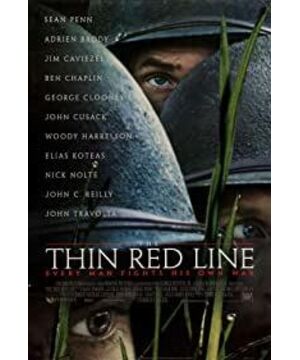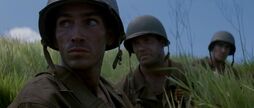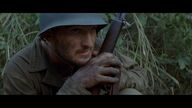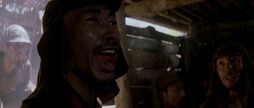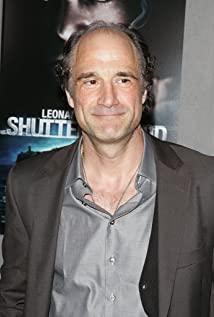Is a person's life numb and full of fantasy? When everyone's dreams and life become the same, is it that those souls are lost without a trace?
It is not only war that is all that mankind has, but mankind has paid all of itself because of war. Not only the soldiers at that time tasted the grief of war, all the present, all moments, are feeling a kind of grief called desire, a kind of grief called war.
Happy in the conscious, helpless in the subconscious.
This film review is just a whisper,
this film review is just a leftover ink,
this film review is just a transparent blue thread in the gap.
This review is just a little self-consolation in the dampness.
Maybe everyone doesn't know how to cherish, maybe everyone doesn't know how to care about their own soul, maybe everyone hides in their locked box and doesn't dare to take out the key.
Everyone wants to protect themselves, so are they just refusing to do so cleanly.
Everyone wants to experience them, so they become so desperate in the constant rejection.
Sorry, very ashamed to talk about thin red lines in such poor language as I am.
The following text was handed over to Ge Ying. Yesterday, I dreamed that Ge Ying gave it 41 points. I woke up crying from the dream. After waking up, I continued to cry and walked towards another dream called reality.
Every soul has its own corner, in which there is a kind of spirit that will not be alienated or assimilated, it will remain quietly in the core of the soul, immortal, peaceful, and indifferent to the world, it exudes the brilliance of humanity , is the truth, goodness and beauty of human beings. It is a pity that the wars and killings that devoured it are lurking in the desires of every soul, and it only takes a flick of a finger to make it disillusioned. People want to cry, the film wants to cry, and the cry is silent and tragic.
The sad faces still remained in my mind, the hymns sung by the natives still played in the memory of the voice, and the deep narration still remained in the memory. These become the eternity of every moviegoer who actually walks into the film, while those gunpowder, trenches and gunfire gradually fade away in their minds. How much ingenuity and effort did the film take to build it? How did the profound anti-war ideology behind it pile up and become a common consciousness of the people? Human love, hatred, joy and grief compete with nature; how much of a collision do cruelty, serenity and harmony collide? Does the film's equal human perspective further explore the essence of war destroying everything?
Terrence Malik wrote such an adaptation of Jones' World War II story in the late 20th century with great ambition and a distinctive tone. The story endows ordinary war films with extreme life and death, victory and defeat. But it also carries the most peaceful beauty and timeless beauty in nature. The interlaced narrative of pantheism and the subjective world sublimates war films that generally promote the national and national spirit or individual humanitarianism to explore the subjective connection between the natural world and the spiritual world under war. Wandering at both ends of the cordon between life and death, asking what the brilliance of humanity in the world is.
The storyline of the film is not complicated, and the dramatic effect is not outstanding. The whole story revolves around an American rifle company fighting for several points in Guadalcanal during World War II, and their success or failure was a turning point in the entire campaign. The film did not focus on depicting the process of this battle, and even the director of the final victory and defeat did not intend to explain. The whole of the war, so to speak, transcends its identical objective whole and the whole of the story to which it needs to be compared. What the director approached was not the war, but the hearts of the people in the war. This story may be only a small interlude in the entire grand World War II, but it has long since become the epitome of all mankind and nature due to the strife of evil desires. The audience saw a group of soldiers with a strong subjective color experiencing a brutal dispute. Typical characters, well-organized plots, simple and concise photography shots, and obvious time and place successfully entered the inner world of each artistic image, making everyone amazed, scared, and moved.
The first construction of the film is the alternation of character lines and background music. While the soldier Werther communicated with the indigenous people, his inner monologue also sounded. The line exchanges and inner monologues of soldiers with different personalities and different beliefs on the military ship, various narrations in the battle, in the soulful background music instead of the noisy ambient sound and offset the passionate melody of war films, like a dignified epic The recitation, which evokes the audience's thinking, becomes a common sound impression. Subjective narration and monologue are not simply combined, it promotes the development of the entire film, and resonates with each other. The resulting unity of understanding and diversity of attitudes enrich the film. Such narrative stories featuring narration are like the associations generated by books, which evoke continuous imagination and thinking. The underlying cry in the heart echoes the fragmented hustle and bustle of the film and the sounds of nature. And the director uses this echo to create a shocking sound in the film. Words that explore the entire philosophical world and the entire philosophical life are a review of human nature, nature, and desires for thousands of years. Perhaps what people see is not a war, but a history of human beings. A cultural essay with sentient beings.
"Perhaps everyone has the same soul, with the same face and ego." - Because war confuses individual and group consciousness, everyone becomes a numb war machine.
"No one wants to be redeemed, like burning coals sucked from fire." - People's sense of existence causes them to be born with worry and panic, while people's self-protection consciousness wants to use gods to see themselves as redeemed .
"I was buried in a coffin, and I couldn't lift the lid." - People in war have been hiding in moving coffins. Even if they want to release the freedom of their souls, they are afraid and powerless because of the cruelty of war.
"Who can decide a person's life and death?" - There is no conqueror to decide life and death between people, but people in war helplessly have such a supreme and terrible and cruel right.
The subject and structure of film photography is not organized for the audience's vision and wonderful word of mouth, not so that every soldier has a complete, unified face in the consciousness of his own country; on the contrary, all these scattered qualities constitute An enlarged whole, a group of people who are dominated by fate by others, and individuals have no way out of self-choice. The world of war in photography connects the same ambiguity and the same absurdity of the characters' inner worlds.
The director elevates the film to the height of human nature and nature and thus shocks the soul, rather than staying in the bias of national wars. It is inseparable from the uniqueness of its photography lighting. When the overall exposure in the film is biased towards the natural landscape, the horizontal exposure value of the characters drops. Therefore, reduce the portrayal of the character's appearance and look directly at the heart. The natural landscape is further processed and beautified. Films are almost always shot in pure natural light. It is very difficult to shoot a feature film with pure natural light. The change of light can change the entire time node, as well as the narrative atmosphere of the entire story and the emotions it brings to the viewers. While shooting a feature film, while seeking realism, it is difficult to grasp the natural light effect, and it is easy to make mistakes. Therefore, most directors try to avoid the mistakes and try their best to meet the requirements of reality, but director Terence Malik did not deliberately hide it, but organized its linear series to create the effect of internal contrast. Taking the film itself as an example, the natural light effect of Werther living with the indigenous people on an isolated island before the battle has begun, endows peace and tranquility, while the natural light effect on Guadalcanal after the battle begins, endows the changeable unease. viewing effect. The two different pure natural lights do not create a huge contrast in the same scene, but create a huge internal contrast in the viewer's heart. In addition, a third of the film is in the battle on the green lawns of the South Pacific, and there are a lot of light outages. In the same scene, in the two-day war, there were a lot of flaws, so we can think about whether the director deliberately formed a certain style in this way, which can get closer to the inner world of the characters, and therefore can speak more clearly. The audience is free from the war, looking back at the war and generating anti-war ideas. From "Rose Dawn Begins" to Sko's stomach cramps, to the quarrel between the captain and Stados, and the death of a soldier who accidentally pulled a grenade fuse, the film advances step by step to the climax of the story, but the light lingers repeatedly in the The magic hour and the noontime scene, and even the plot prompting Stados to report the time of the war, produced a light loss of adjacent shots. As well as appearing in the front and back shots, it makes the viewers feel a certain unreality, and gives the audience more space to communicate with the artistic characters, so it is close to the hearts of the characters. In the second battle, the humidity was heavy, and the silhouette effect produced by the smoky backlit jungle was only the sound of gunshots and the figures of runners, and the sense of solemnity became more and more intense. This style stretches the strength of the expression of the theme, the uncertainty of time continues the long unease of the war, aggravates the fear from the war, and thus shows the group-oriented inner world. It doesn't matter where they come from, whether they are individual organisms or The life form of the race is no longer important, what matters is only their inner world. The soldiers' anxiety, panic, helplessness, grief, and their longing for peace and happiness have increased their ups and downs. The characters are thus shaped and the themes are accentuated.
The film always sends us a message that what caused the tragedy of both sides is the cold weapons and deafening bullets and guns, not the violence between people's bodies, which has a lot to do with the photography movement and angle. In the battle, there is no series of fast-paced action shots and extreme up-and-down shots. Often, the camera takes the place of the enemy's perspective, and at the climax of the war, there are sporadic scenes of fighting between the two sides. The war scene that should have been compact was unexpectedly controlled and soothed. The camera stayed on the expression of a certain soldier for a long time, even the sound of their breathing seemed to be felt by us. The slow moving rhythm, such as the snooping quietly following the camera, has almost become an emissary of tranquility, taking away the smog of war scenes and strife, but instead brings tranquility and a single mirror image into the painting. The film creates a relaxing and beautiful scene in this way, which is in contrast to the mark that war once gave to the world. In human history, war is a black and white history, but in the beautiful green of the film, there is no way to arouse the passion and excitement of war. , not even tragic. The audience can silently feel the silent war, the silent grief, and the silent shock. This is also the director's deliberate beautification of the language of the camera lens to create a poetic scene, but it is narrating the original human desire of human beings. . The state of uniform photography makes this beautiful island more solemn and lonely. Fixed shots and empty shots intensify the speechless dialogue and look at each other between the human world and the natural world. The camera stopped more than once on the faces of the emaciated soldiers, narrating the destruction of the war on them. The camera also looks at the fire-destroyed Japanese garrison like a witness, exiling people's instinctive thinking to the boundless nature. Everyone’s desire for life is the essence of war, but in the film, the exchange of life and death, the exchange of strength and weakness, appears from time to time. Perhaps what it wants to tell is not only war, but also that people face life to death, strong to weak Introspection is not only in the individual of life, but also in the subconscious of the soul.
The director used a long poetic shot to leave the American soldier Werther alone to steer away and block the enemy. The enemy used green leaves to disguise himself, just like a living creature disguised itself with a protective color, it was just a desire for life. But one cannot help but reflect on whether he chose to die because of the army, or because of the war, or because of his nostalgia for pure life. The camera starts from Werther's subjective perspective, which is when the Japanese army speaks. There are seven shots in total, from surround to advance, from changing angles to changing characters, and from pulling out to looking around the forest. The seven shots did not overlook any angle that looked directly into the hearts of the characters. Werther was like a petite bird in front of a human being in front of the enemy, and Werther was as powerless in front of an incomprehensible language like a livestock in front of Chinese people who spoke Chinese. , appears helpless. He couldn't express anything in front of the gun. With the only eyes may be able to cry the final helpless to the war. The director didn't have any extra footage for him after the shot, he was dead. Perhaps he has returned to nature, to the purity of greenery, to the jungle under the leaves through the lens of sunlight, to the moment when he used to play with children at the bottom of the sea, and back to a world where he released himself. He also saw a group of mourning crowds fighting in this beautiful greenery. Saw all the lies. "Where's the splendor of your life?" Did it disappear because of death? Or disappear by survival? They can only find a way out by escaping from their own grave-like island. This is precisely the purpose of moving the camera sideways and watching them leave the island. It is also the purpose of the camera to watch the waves in the sea from their subjective perspective. Purpose. At this moment, they have returned to the original point after all the hard work, and the exhaustion and boredom they carry will always be smudged and lingering. Ironically, no matter whether they are at war or not, the island is still so peaceful, like a leaf on the beach where the camera stops at the end, still watching everyone in the world like the eyes of God. a soul. Aboriginal chants will still be played. Will the human beings in the non-war at this moment think about the value of this small island like those soldiers. This small island is the beginning and the end of the war. It is the most beautiful place in the human heart, and it is also the ugliest place in the human heart. In this space, people can reflect the ugliness of others like a mirror, and they can also see the truth, goodness and beauty of others. You can see your own ugliness and feel the beauty of self-redemption. The brilliance of humanity flickered on the edge of the red warning line, flickering on and off.
Both sides of the battle hiding in the tropical rain forest are in the beautiful natural landscape, but they may not be able to feel it. Such an arrangement is not found in other general war films. The photographer has portrayed the beauty of the island to the extreme, a leaf, a beam of light, a bird, the whole mountain, this sea, the whole jungle, and the saturated color blocks have an impact, making the film's tones rich and colorful. . Why does the poetic world so carefully portrayed coexist with violence? Why is such harmony and peace linked to the struggle of evil? Indeed, the film has the ability to question people's hearts and create a rich sensory experience with this tone and color block to increase the contrast. The wind and grass here, the flowers and grass, the warm beach, and the beautiful scenery all make people close to happiness and the warmth of home. People and nature are closely connected and integrated into one. Humanism walking side by side with nature seems to be It is the decoding of the earth, and we need to decipher them one by one. Just like the Hanging Gardens of Babylon and the Garden of Eden that too many people yearn for, every minute and every second of it is worthy of admiration for the audience. The construction of bridges between nature and people also reinforces the theme. The visual sense of the film jumps in the beautiful scenery, the tears of the soldiers and the constant flashback memories. In the theme, eternity has long been formed.
Flashing back, it was a loving mother stroking the little girl's hand.
Flashing back, it was the Yingwu general who accompanied the little boy.
Flashed back, it was Werther's prayer before an erratic candle.
In a flashback, it was a woman's gentle village and her husband's ears and temples.
Flashed back, it was the wind blowing the curtains. Just a peace.
The director has established too much desire and too much thinking in the human world and the natural world, and has also established indeterminate coordinates in the reality of war. Which end of the line of life and death is he hovering at? On which side of national interests and personal interests is it to stay? All this is just endless ellipses. Whether it is in the human world of war or the natural world, there are disadvantages of post-industrialization, and the warning line of life and death affects people's thinking through war. And the big contrast that occurs from time to time is how the director carefully arranges it so that future generations can understand it.
Desires have been a constant topic for people since ancient times. In the film, those people who inflate force in the war to conquer their desires are not just hiding other desires that many normal people have. A soldier said, "I haven't touched a woman since I joined the army, and I don't want to have desires." They suppressed the desires of ordinary people and over-focused on the conquest of their savings, which inflated the bloody and ferocity of human nature. It has also become a fuse to destroy others. Is there no such problem in today's society? Haven't we seen the cruelty to each other in the seemingly peaceful and serene office? Humanity's desire to conquer has already been expanded to the limit. Just as the film "Avatar" wants to express, how much can we see in "The Thin Red Line". In the cruel life and death, there is no communication. The war discards beliefs and longings, and drowns the last brilliance between life and death. The temporary victory of the American soldiers and the Japanese soldiers is not their end. They feel the same when they feel the loss of their companions, the disappearance of national interests, and the death of individuals. War is always the culprit. In the prisoner of war area, there is no difference between the value of dead people and the value of dead dogs. Such a human attitude is a kind of devastation. No one can do anything in this situation, and no one can represent and advertise justice and kindness.
"I waited fifteen years for this war." What is the value of a soldier? Is it to protect the country? Or for the realization of personal aspirations? No matter which one the soldier chooses, he has lost his true and pure self and betrayed his original innocence. As they go through countless killing battles, they look back on themselves, and eventually even the numbness fades away. They want to maintain a peaceful paradise, but they know that long live peace and long live love are as worthless as powder, and they will eventually despair. People under the military mechanism are like the machines of the state, and they are not allowed to violate the organization. They can only become the same kind of people, and many people have the same face and soul. How to bring back the brilliance of human nature? Human beings always have contradictions between natural nature and reason. The earth also grows in the contradiction between survival of the fittest and beauty and tranquility. Human nature and nature are hovering on the edge of life and death, looming. Only the truth, the good and the beautiful nurture its brilliance, and war and evil desires can only obliterate its brilliance. In a crowd, people should not feel lonely, but the soldiers in the film have this feeling. When the communication between people isolates the truth, the good and the beautiful, then the individual in the human world is truly lonely. The tragic and solemn emotions in the film are also looming in some touching plots, the deep friendship between the warriors, the warrior's personal sacrifice, and the warrior's persistent belief in love and yearning for happiness and peace. These are like a chant of the indigenous people, which deeply moved every viewer.
The final world is still the only one. We once had the world of Guadalcanal, and the people of the island could not avoid it because of our desire for conquest between nations. But their kind of truth, goodness and beauty has already melted everything. The thin red line is carrying out the origin of life from beginning to end. There is no gap between the existence of man and nature, but the immortality of the human spirit is the soul of all things and the core of all things. The image of the sun rising above the trees, the dying birds, and the busy world of insects is no different from the busy search for life in society. The truth, goodness and beauty of human beings and nature will never be parallel. And so is the origin of life. And whether the development of science can promote the happiness of human beings? Has war eliminated human fear and hostility? Perhaps only truth, goodness and beauty can promote the immortality of the human spirit, and only harmony and tranquility can truly understand the origin of life. The space for reflection in the film may no longer be on the brink of war, but the collision space between the hard and the soft in human nature.
The line between life and death is not the victory and defeat that human beings are striving for, nor is it a deal to God due to strength or weakness. It is simply a way out of spiritual immortality. The red cordon played the tragic song of war with a unique lens language. In the end, we must let human beings understand this tragedy, let human beings understand human nature and nature, and let human beings choose life and death, spirit and brilliance. Desires, wars, and evil are never the whole of man.
View more about The Thin Red Line reviews


